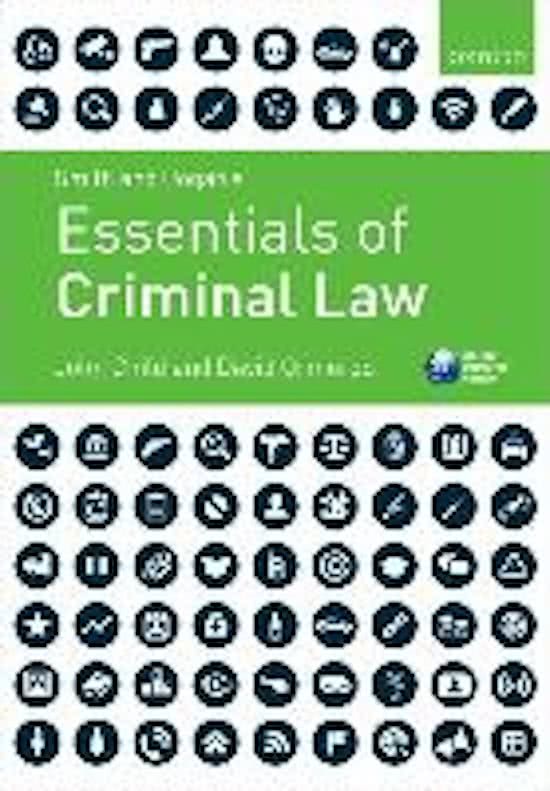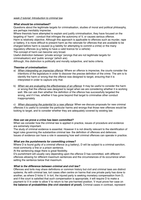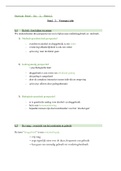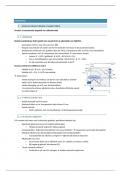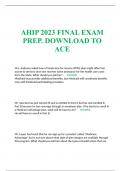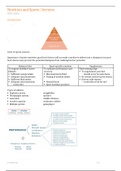week 2 tutorial: Introduction to criminal law
What should be criminalised?
Questions about the legitimate targets for criminalisation, studies of moral and political philosophy,
are perhaps inevitably imprecise.
Where theorists have attempted to explain and justify criminalisation, they have focused on the
targeting of ‘harm’ : conduct that infringes the autonomy of V, or causes serious offence.
Harm is relatively objective. Although this approach is applicable to offences such as murder, rape
or battery, it is more difficult to present harm as the rationale for offences that are available to be
charged before harm is caused (e.g liability for attempting to commit a crime) or the many
regulatory offences (e.g failing to have a valid licence for a vehicle)
The concept of harm can become very broad.
Useful distinction between ‘private wrongs’ (wrongs that are not legitimate targets for
criminalisation) and ‘public wrongs’ (which are).
Although, this distinction is politically and morally subjective, and lacks criteria.
Theories of criminalisation:
a) When interpreting an imprecise offence: Where an offence is imprecise, the courts consider the
intentions of the legislature in order to discover the precise definition of the crime. The aim is to
identify the harm or wrong that the offence was designed to target, ensuring that it is
interpreted in order to capture only that.
b) When we are evaluating the effectiveness of an offence: It may be useful to consider the harm
or wrong that the offence was designed to target when we are considering whether it is working
well. We can ask then whether the definition of the offence has successfully targeted the
wrong, and if it has, whether it has gone beyond that target to criminalise other conduct
inappropriately.
c) When discussing the potential for a new offence: When we discuss proposals for new criminal
offences it is useful to consider the particular harms and wrongs that those new offences would be
looking to target, and to consider whether they are adequately covered by existing law.
How can we prove a crime has been committed?
When we consider how the criminal law is applied in practice, issues of procedure and evidence
are extremely important.
The study of criminal evidence is essential. However it is not directly relevant to the identification of
legal rules governing the substantive criminal law- the definition of offences and defences.
Issues of evidence can have a role in assessing how well criminal offences can operate in practice.
What are the punishments for committing crimes?
Where D is found guilty of a criminal offence (e.g battery), D will be subject to a criminal sanction,
most commonly a fine or a prison sentence.
At the sentencing stage there is great flexibility.
D’s punishment will usually vary depending upon the offence D has committed, with different
offences allowing for different maximum sentences and the circumstances of its occurrence when
setting the sentence below that maximum.
What is the difference between criminal and civil law?
Offences and torts may share definitions or common history but civil and criminal laws are distinct
systems. As with criminal law, tort cases often centre on harms that one private party has done to
another, as where D kicks V. In tort, the injured party is seeking monetary compensation from D,
and if the court is satisfied that such compensation is appropriate, it will require D to make a
payment to V in order to allow V to return to her pre-harmed position. V must prove her case on
the balance of probabilities (the civil standard of proof). Criminal cases in contrast, represent
What should be criminalised?
Questions about the legitimate targets for criminalisation, studies of moral and political philosophy,
are perhaps inevitably imprecise.
Where theorists have attempted to explain and justify criminalisation, they have focused on the
targeting of ‘harm’ : conduct that infringes the autonomy of V, or causes serious offence.
Harm is relatively objective. Although this approach is applicable to offences such as murder, rape
or battery, it is more difficult to present harm as the rationale for offences that are available to be
charged before harm is caused (e.g liability for attempting to commit a crime) or the many
regulatory offences (e.g failing to have a valid licence for a vehicle)
The concept of harm can become very broad.
Useful distinction between ‘private wrongs’ (wrongs that are not legitimate targets for
criminalisation) and ‘public wrongs’ (which are).
Although, this distinction is politically and morally subjective, and lacks criteria.
Theories of criminalisation:
a) When interpreting an imprecise offence: Where an offence is imprecise, the courts consider the
intentions of the legislature in order to discover the precise definition of the crime. The aim is to
identify the harm or wrong that the offence was designed to target, ensuring that it is
interpreted in order to capture only that.
b) When we are evaluating the effectiveness of an offence: It may be useful to consider the harm
or wrong that the offence was designed to target when we are considering whether it is working
well. We can ask then whether the definition of the offence has successfully targeted the
wrong, and if it has, whether it has gone beyond that target to criminalise other conduct
inappropriately.
c) When discussing the potential for a new offence: When we discuss proposals for new criminal
offences it is useful to consider the particular harms and wrongs that those new offences would be
looking to target, and to consider whether they are adequately covered by existing law.
How can we prove a crime has been committed?
When we consider how the criminal law is applied in practice, issues of procedure and evidence
are extremely important.
The study of criminal evidence is essential. However it is not directly relevant to the identification of
legal rules governing the substantive criminal law- the definition of offences and defences.
Issues of evidence can have a role in assessing how well criminal offences can operate in practice.
What are the punishments for committing crimes?
Where D is found guilty of a criminal offence (e.g battery), D will be subject to a criminal sanction,
most commonly a fine or a prison sentence.
At the sentencing stage there is great flexibility.
D’s punishment will usually vary depending upon the offence D has committed, with different
offences allowing for different maximum sentences and the circumstances of its occurrence when
setting the sentence below that maximum.
What is the difference between criminal and civil law?
Offences and torts may share definitions or common history but civil and criminal laws are distinct
systems. As with criminal law, tort cases often centre on harms that one private party has done to
another, as where D kicks V. In tort, the injured party is seeking monetary compensation from D,
and if the court is satisfied that such compensation is appropriate, it will require D to make a
payment to V in order to allow V to return to her pre-harmed position. V must prove her case on
the balance of probabilities (the civil standard of proof). Criminal cases in contrast, represent

